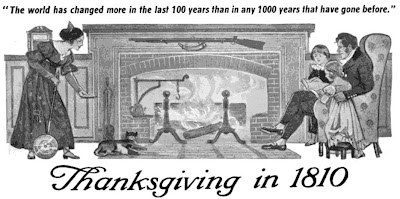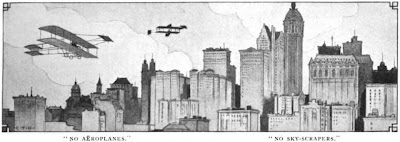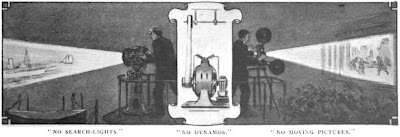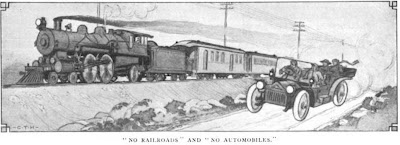Thanksgiving in 1810, 1910, and 2010
 Every Thanksgiving, American readers of newspapers and magazines are treated to similar nostalgic pieces about the origins of Thanksgiving and the uniqueness of the holiday.
Every Thanksgiving, American readers of newspapers and magazines are treated to similar nostalgic pieces about the origins of Thanksgiving and the uniqueness of the holiday.
It was no exception in 1910, one hundred years ago, in the pages of St. Nicholas: An Illustrated Magazine for Young Folks, a then popular family magazine. In that publication’s November 1910 issue, writer Clifford Howard authored a piece called “Thanksgiving in 1810,” in which he looked back a century to see how far the nation had progressed since that time. What a fun and intriguing article to stumble across exactly one hundred years later (particularly with the stellar illustrations by C.T. Hill, some of which we’ve embedded here in click to enlarge format).
“The world has changed more in the last 100 years than in any 1000 years that have gone before,” Howard wrote, not knowing how much that change would accelerate in the coming years. But surely, in writing such a piece, Howard wondered whether anyone a century from his time would look back to 1910 and comment upon similar changes in the culture. Of course he did. In fact, he ended his piece with the question, “[W]hat will it be in 2010? Who can tell?”
So, we here at Abnormal Use, denizens of 2010, will take it upon ourselves this Thanksgiving week to revisit Howard’s long forgotten article from that long forgotten magazine. (Considering the nature of his task, we think he would appreciate our responding via the Internet, a medium that he could not have imagined in his wildest dreams way back in 1910).
 Most of Howard’s commentary concerned the huge advances in technology that occurred in the century preceding the publication of his piece. Thus, he began with the following premise:
Most of Howard’s commentary concerned the huge advances in technology that occurred in the century preceding the publication of his piece. Thus, he began with the following premise:
A hundred years back may seem a long while ago, but when you remember that there are men living to-day whose fathers saw General Washington, a century does not seem so long a time after all. And up to the time of Washington a hundred years did not mean very much to the human race. The world moved very slowly. When Washington died, in 1799, people were using the same sort of appliances and doing the same things in the same way that they did in 1699 and even 1599. In former times, if a man could have returned to earth at the end of a hundred years, he would not have been very much surprised at any of the changes that had taken place during this absence. But if Washington or Franklin, or even Thomas Jefferson, who died less than a century ago, were to come back to earth now, he would not know where he was.
Howard notes the obvious, that the citizens of 1810 had no “air ships or automobiles or motor-cycles,” and so of course, travel was not nearly as speedy as it was for those of 1910. But then he ponders how those of 1810 would interpret the technological marvels of the early 20th century:
In fact, not only the humble farmer of that day, but the scientist and philosopher as well, would have found it impossible to believe all the wonderful things that were to take place within the century. If you could have lived then and looked ahead a hundred years and told your friends and neighbors that men would travel by steam and electricity, that they would fly in the air from London to Manchester, or from New York to Philadelphia, that they would talk to one another from Boston to Chicago, they would flash news across the ocean in the twinkling of an eye, that the great wilderness beyond the Mississippi would be populated with millions of people and contain some of the big cities of the world, that men and woman would go across the Atlantic and across the vast continent of America in perfect ease and comfort and in less time than it then took to journey from New York to Washington – if in 1810 you had foretold these marvelous things, your friends and neighbors would have shaken their heads and whispered sadly to one another that you were crazy. If the wonders you related to them were to come to pass during the next thousand years, they perhaps would have admitted that there might be truth in some of your stories; but to say that they would all come true inside of a hundred years and that some of the very people to whom you were talking would live to see many of these magical inventions, would have been really to much for any sane person to believe.
Fifty years later, Arthur C. Clarke would summarize the same sentiment when he wrote that “[a]ny sufficiently advanced technology is indistinguishable from magic.”
 Of particular interest is Howard’s comparison of the communications infrastructure of both time periods. When we, as modern readers, study history, we have an omniscient view based upon the many events pieced together by the historian. We know what was occurring at all relevant times in all relevant places. But the participants of those historical events had no such luxury. News traveled very, very slowly in 1810, at a molasses like pace even by 1910 standards:
Of particular interest is Howard’s comparison of the communications infrastructure of both time periods. When we, as modern readers, study history, we have an omniscient view based upon the many events pieced together by the historian. We know what was occurring at all relevant times in all relevant places. But the participants of those historical events had no such luxury. News traveled very, very slowly in 1810, at a molasses like pace even by 1910 standards:
As there were no railroads, news traveled only as fast as a horse could run or a ship could sail. There were no wires to carry messages, for there was no telegraph and there was no telephone.
…
If the farmer of 1810 got a newspaper at all, it was a week or a month or perhaps three months old before it reached him.
 Imagine what Howard would think of live television or the Internet. Would he be able to comprehend Facebook or Twitter? Or the technology which allows each of us, with everyday devices, to capture a moment on film or video and share it with the world instantly? What would he think of the notion that in this age we are all pamphleteers and publishers?
Imagine what Howard would think of live television or the Internet. Would he be able to comprehend Facebook or Twitter? Or the technology which allows each of us, with everyday devices, to capture a moment on film or video and share it with the world instantly? What would he think of the notion that in this age we are all pamphleteers and publishers?
On a side note, we, as proprietors of a legal blog, can’t help but wonder just how different the practice of law was in 1910 based, in part, on the aforementioned differences in communications technology. It was certainly slower, in that litigators could not easily save and alter legal forms and blast them out instantly via fax or email. Never mind the fact that the information gathering process must have been slow, as well, simply because not everyone had telephones. Documents were locked away in dusty file rooms of courthouses, not available with a quick digital search. But the advantage of that may have been that lawyers weren’t scurrying about all the time in such great haste to perform this task or file that motion. Might the practice have been described as slow but rewarding? We can only surmise based on what we know in hindsight.
- Howard observes that in 1810, the states of Florida, Texas, and California were not yet a part of the nation and were, thus, merely “waste places or foreign lands.” Ouch.
- Howard notes that Thanksgiving, as his generation knew it, was not celebrated officially outside of New England in 1810.
- Most newspapers in 1810 were issued only weekly, and the would be news contained therein was a few days to half a year old.
What will it be in 2110? Who can tell?
So, what became of Howard the writer and the publication to which he submitted this piece?
The St. Nicholas magazine, which began publishing in the 1870’s, folded in the 1940’s. Howard, for his part, didn’t make it to the halfway point of the 20th century, either. He died in 1942, at the age of 73, apparently after spending some time in Hollywood writing movies. According to his brief New York Times obituary (behind that site’s paywall archive), Howard “worked with Cecile B. De Mille and his research was largely used for the film King of Kings.” He was the author of many magazine articles and a number of books (and his work wasn’t always family friendly, either).
Here’s the best nugget we discovered about Howard’s life and education: According to this 1895 mini-biography of Howard published in a poetry journal, he once studied the law! It notes: “Like many others in their gradus ad Parnassum, he devoted some time to the study of law, graduating with the title of L.L.B. from the Columbian University in 1890, only to find that Blackstone and Kent were uncongenial masters and that his literary aspirations would never be content within the narrow bounds of prosaic law.”
Well, at least that’s something that hasn’t changed since 1910.
















Pingback: Thanksgiving in 1810, 1910, and 2013 | Abnormal Use